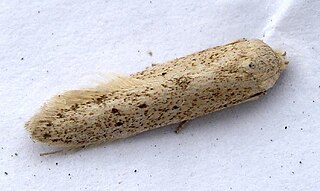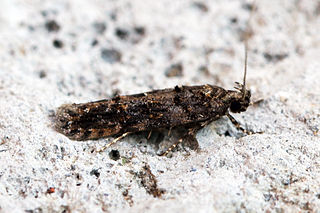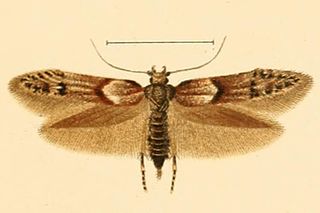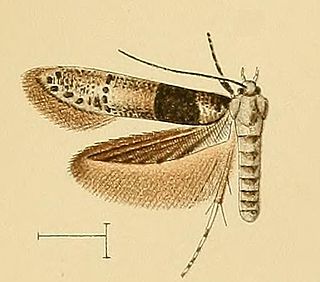
The feathered thorn is a moth of the family Geometridae. It was first described by Carl Linnaeus in 1761.

Blastobasis is the type genus of the gelechioid moth family Blastobasidae; in some arrangements these are placed in the case-bearer family (Coleophoridae) as a subfamily. Within the Blastobasidae, the subfamily Blastobasinae has been established to distinguish the Blastobasis lineage from the group around Holcocera, but the delimitation is not yet well-resolved.

Thera variata, the spruce carpet, is a moth of the family Geometridae. It is found throughout Europe, North Asia and Japan. The common name spruce carpet is also used when referring to Thera britannica.

Pyrausta despicata, the straw-barred pearl, is a species of moth of the family Crambidae. It was described by Giovanni Antonio Scopoli in his 1763 Entomologia Carniolica.

Simyra albovenosa, the reed dagger, is a moth of the family Noctuidae. It is found in most of Europe, then Turkey, Iran, Transcaucasus and into the east Palearctic.

Eublemma minutata, the scarce marbled, is a species of moth of the family Erebidae. It can be found everywhere in Europe, except for Luxembourg, the Netherlands, the northern part of Russia and various islands. In Asia, it can be found only in Lebanon.

Teleiopsis diffinis is a moth of the family Gelechiidae. It is found in Europe, North Africa, the Near East, central Asia and Siberia (Transbaikalia).
Blastobasis vittata is a moth of the family Blastobasidae. It was thought to be endemic to Madeira but is now known to inhabit the Netherlands, France, the Channel Islands, England and Northern Ireland.

Cochylis roseana is a moth of the family Tortricidae. It is found in most of Europe, Uralsk, Iran, Asia Minor and China (Gansu).

Blastobasis decolorella is a moth in the family Blastobasidae. It is found on Madeira and in Portugal. Records from England and possibly also the Netherlands are based on misidentifications of Blastobasis lacticolella.
Blastobasis desertarum is a moth in the family Blastobasidae. It is found on Madeira and the Azores. The species was recorded from greenhouses in Berlin in 2005, where it was incidentally introduced.
Blastobasis divisus is a moth in the family Blastobasidae. It is found on Madeira.

Blastobasis exclusa is a moth in the family Blastobasidae. It is found on the Canary Islands.

Blastobasis helleri is a moth in the family Blastobasidae. It is found on the Canary Islands.
Blastobasis magna is a moth in the family Blastobasidae. It is found on the Channel Islands, in Italy, Portugal, Spain and on Sardinia and Sicily.

Blastobasis rubiginosella is a moth in the family Blastobasidae. It is found on the Canary Islands.

Blastobasis velutina is a moth in the family Blastobasidae. It is found on the Canary Islands.
Zarcinia melanozestas is a moth in the family Plutellidae. It is found in Russia.
Apatema mediopallidum is a moth of the family Autostichidae. It is found on Corsica, Sardinia, Sicily, Malta, Crete, Cyprus and in Portugal, Spain, France, Italy, Austria, Hungary, Albania, the Czech Republic, Romania, Bulgaria, North Macedonia, Greece, Turkey and on the Canary Islands.
Cyclophora maderensis is a moth in the family Geometridae. It is found on the Canary Islands and Madeira.











